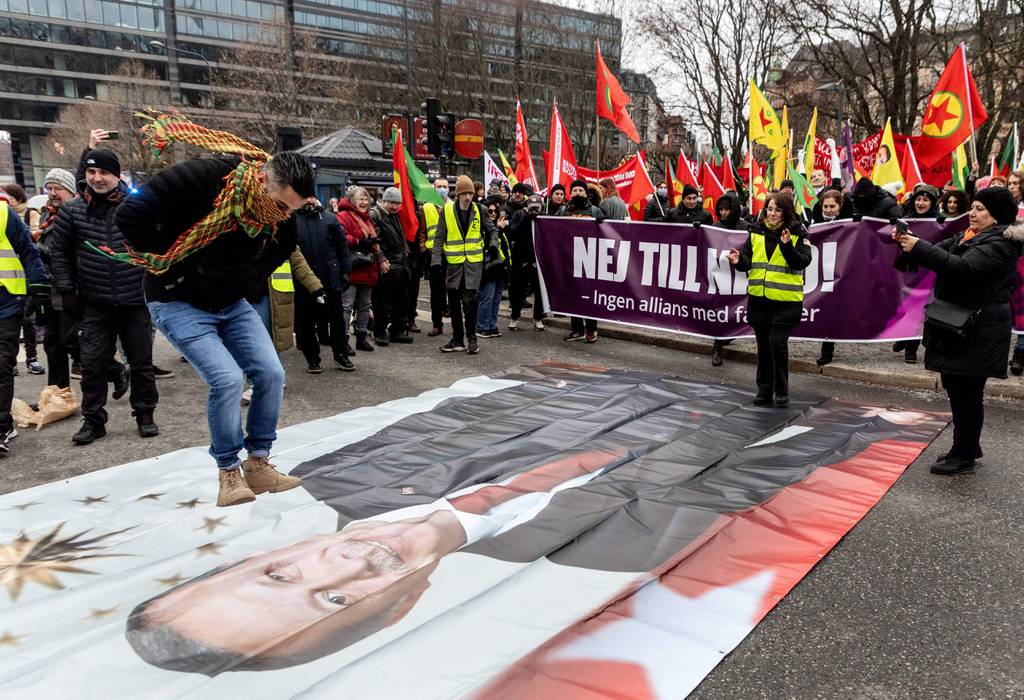
HELSINKI — Turkish President Recep Tayyip Erdoğan’s dogged opposition to Sweden’s application for membership of NATO has stymied hopes in Stockholm and Helsinki that Ankara will give its approval ahead of parliamentary elections in Turkey slated for May 14.
The already tense diplomatic relations between Turkey and Sweden were strained further on Jan. 21 when Danish politician, Rasmus Paludan, burned a copy of the Quran in front of the Turkish Embassy in Stockholm. An effigy of Erdoğan was also “hung” during the protest by Kurd separatists.
Turkey wants Finland and Sweden to implement all aspects of the Trilateral Memorandum (TR) signed by the three countries in June 2022. The TR demands that the Nordic applicant states adopt tougher measures against representatives of terrorism groups, including the PKK, in their countries.
Additionally, Turkey is demanding that Sweden and Finland end their “arms embargo” on Turkey, setting this as a condition of Ankara’s support for their NATO membership.
Finland and Sweden do not operate official bans on the export of military equipment to Turkey, but neither country has issued export licenses since Turkey launched a ground attack offensive against Syrian Kurds in south-eastern Syria in 2019.
The leader of Denmark’s ultra-right-wing Hard Line party, Paludan, came to the attention of Danish and Swedish authorities in April 2022 when he revealed plans for a “Koran burning tour” in Sweden and Denmark during the Muslim holy month of Ramadan.
Paludan initially abandoned the plan following warnings of possible arrest by authorities in Sweden and Denmark.
Turkey responded angrily to the burning of the Quran in Stockholm, accusing the Swedish government of compliance by failing to stop the anti-Islam protest led by Kurdish activists. Turkish President Erdoğan warned Stockholm that Sweden should “no longer count on Turkey’s support for its bid to join NATO.”
The rising concern over Turkey’s negative position on Sweden’s NATO membership has resulted in a deepening of cross-border talks between Stockholm and Helsinki. The two Nordic unaligned states had planned to “jump together” in to the Alliance. The scaled-up tensions between Turkey and Sweden are endangering that ambition.
Finland is holding more regular talks with Sweden to deal with the problems besetting the accession process. Recent talks since Jan. 26 have involved meetings between Sweden’s Foreign Minister Tobias Billström, NATO Secretary-General Jens Stoltenberg and Finland’s Foreign Minister Pekka Haavisto.
“Finland and Sweden remain in agreement, that irrespective of all current objections and obstacles we will continue our joint journey into NATO. We plan to work on common measures to ratify our membership and join at the same time. Against the backdrop of the events in Stockholm, I honestly do not think we will see any significant progress in that ratification before the elections in Turkey in May,” Haavisto said.
Sweden and Finland are now hoping, based on the outcome of May elections in Turkey, that both countries could receive Turkey’s support to ratify membership before the NATO Summit scheduled for Vilnius, Lithuania, on July 11.
Sweden and Finland remain optimistic they will obtain membership approval from Hungary in February or March. Hungary and Turkey are the two NATO member states that have yet to ratify the two Nordic countries’ accession bids.
Turkey’s strong opposition to Sweden’s NATO application, while it remains more open to Finnish membership, has raised concerns that Ankara may be playing politics with a sensitive defense issue.
Erdoğan’s open hostility towards Sweden could be aimed at gaining more influence in NATO and with the United States, said Aras Lindh, a Middle East and North Africa researcher at the Swedish Foreign Policy Institute.
“The possibility that Erdoğan’s words form a tactical statement must not be ignored. It could be an attempt to drive a wedge between Sweden and Finland, or a response to the United States,” Lindh said.
With Turkey disapproving of Sweden’s membership application, prime minister Ulf Kristersson’s government could face the stark prospect of having to abandon its candidacy of NATO, a development that would isolate it from all other Nordic states in the Alliance and serve to potentially weaken traditional and longstanding pan-Nordic defense collaboration.
The accession by Finland and Sweden to NATO will take longer than anticipated, said Paul Levin, Director of Stockholm University’s Institute for Turkish Studies.
“Relations between Sweden and Turkey have been fraught with tension for some time. The same is true for Turkey’s relations with Finland. However, these latest developments and the undertone of statements by Turkey’s president have sharpened significantly. The rift will take time to heal,” Levin said.
The mood in Helsinki, which is closely monitoring diplomatic interactions between Stockholm and Ankara, remains cautiously optimistic that progress can be made to move the status of Finland’s and Sweden’s applications forward with Turkey’s support.
Finland’s President, Sauli Niinistö, told a press briefing in Helsinki on Jan. 27 that “serious discussions” are required with the Erdoğan government to restore trust between the three countries while prioritizing the implementation of all strands of the TR before the NATO Summit in July.
“There needs to be serious man-to-man discussions with President Erdoğan. Right now, it’s starting to look very much as if the Turkish presidential elections will take precedence and not much will happen before then,” Niinistö said.
Turkey’s more favorable view of Finland’s NATO application is helped by a number of important recent events. Finland’s Ministry of Defense granted new defense materiel export permits to Turkey in mid-January 2023, allowing the shipment of reinforced steel from the Raahe-based company Miilux Oy.
In 2021, the MoD rejected an export license application by Miilux to export steel for use in the manufacture of armored vehicles in Turkey. Seventy percent of Miilux’s shares are owned by the Turkish OYAK pension fund. The MoD is currently engaged in adopting new measures to simplify the export of military kits to Turkey
Gerard O’Dwyer is the Scandinavian affairs correspondent for Defense News.
- SEO Powered Content & PR Distribution. Get Amplified Today.
- Platoblockchain. Web3 Metaverse Intelligence. Knowledge Amplified. Access Here.
- Source: https://www.defensenews.com/global/europe/2023/01/30/turkey-frustrates-finlands-and-swedens-nato-bids/



